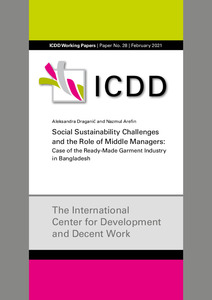Datum
2021-02Schlagwort
300 Sozialwissenschaften, Soziologie BangladeschKonfektionBekleidungsindustrieNachhaltigkeitArbeitsbedingungenMittleres ManagementMetadata
Zur Langanzeige
Working paper
Social Sustainability Challenges and the Role of Middle Managers
 Link zu kassel university press
Link zu kassel university press

Social Sustainability Challenges and the Role of Middle Managers
Case of the Ready-Made Garment Industry in Bangladesh
Zusammenfassung
Over the last decades, the ready-made garment (RMG) industry in Bangladesh has experienced a remarkable economic growth becoming the backbone of the country’s economy. Nevertheless, the industry is still faced with unsustainable business practices that threaten to hinder the sector’s progress in the future. Among others, these include long working hours, unhealthy work environment, restricted ability of workers to organize, gender-based discrimination and shortage of skilled workforce, in particular mid-level managers. Hence, improvement of managerial knowledge and skills is seen as a necessity for the development of Bangladeshi RMG firms and introduction of sustainable business practices.
According to available research, general obstacles like expat hiring, discrepancy in supply and demand between the educational and industrial sectors, stark male to female occupational segregation and limited training opportunities impede the position of mid-level managers in the Bangladesh RMG sector. In addition to this, our findings indicate that mid-level managers in the Bangladesh RMG sector lack strategic knowledge of social sustainability issues. Furthermore, we perceived that mid-level managers possess underdeveloped soft skills, lack a deeper understanding of gender-related topics and specific needs of the female workers. Lastly, there is a lack of incentives from the side of the top-level management and factory owners in terms of providing mid-level managers further training to acquire the skills necessary for better performance.
According to available research, general obstacles like expat hiring, discrepancy in supply and demand between the educational and industrial sectors, stark male to female occupational segregation and limited training opportunities impede the position of mid-level managers in the Bangladesh RMG sector. In addition to this, our findings indicate that mid-level managers in the Bangladesh RMG sector lack strategic knowledge of social sustainability issues. Furthermore, we perceived that mid-level managers possess underdeveloped soft skills, lack a deeper understanding of gender-related topics and specific needs of the female workers. Lastly, there is a lack of incentives from the side of the top-level management and factory owners in terms of providing mid-level managers further training to acquire the skills necessary for better performance.
Förderhinweis
Research and the print of this working paper was funded by the German Corporation for International Cooperation (GIZ)Druckausgabe
Zitieren
@unpublished{doi:10.17170/kobra-202101182978,
author={Draganić, Aleksandra and Arefin, Nazmul},
title={Social Sustainability Challenges and the Role of Middle Managers},
year={2021}
}
0500 Oax
0501 Text $btxt$2rdacontent
0502 Computermedien $bc$2rdacarrier
1100 2021$n2021
1500 1/eng
2050 ##0##http://hdl.handle.net/123456789/12501
3000 Draganić, Aleksandra
3010 Arefin, Nazmul
4000 Social Sustainability Challenges and the Role of Middle Managers / Draganić, Aleksandra
4030
4060 Online-Ressource
4085 ##0##=u http://nbn-resolving.de/http://hdl.handle.net/123456789/12501=x R
4204 \$dWorking paper
4170 ICDD Working Papers ;; No. 28
5550 {{Bangladesch}}
5550 {{Konfektion}}
5550 {{Bekleidungsindustrie}}
5550 {{Nachhaltigkeit}}
5550 {{Arbeitsbedingungen}}
5550 {{Mittleres Management}}
7136 ##0##http://hdl.handle.net/123456789/12501
<resource xsi:schemaLocation="http://datacite.org/schema/kernel-2.2 http://schema.datacite.org/meta/kernel-2.2/metadata.xsd"> 2021-02-12T11:20:32Z 2021-02-12T11:20:32Z 2021-02 doi:10.17170/kobra-202101182978 http://hdl.handle.net/123456789/12501 Research and the print of this working paper was funded by the German Corporation for International Cooperation (GIZ) eng kassel university press Namensnennung - Weitergabe unter gleichen Bedingungen 4.0 International http://creativecommons.org/licenses/by-sa/4.0/ female-friendly work environment social sustainability long working hours occupational health and safety transnational industry mid-level manager sub-contracting company 300 Social Sustainability Challenges and the Role of Middle Managers Working paper Over the last decades, the ready-made garment (RMG) industry in Bangladesh has experienced a remarkable economic growth becoming the backbone of the country’s economy. Nevertheless, the industry is still faced with unsustainable business practices that threaten to hinder the sector’s progress in the future. Among others, these include long working hours, unhealthy work environment, restricted ability of workers to organize, gender-based discrimination and shortage of skilled workforce, in particular mid-level managers. Hence, improvement of managerial knowledge and skills is seen as a necessity for the development of Bangladeshi RMG firms and introduction of sustainable business practices. According to available research, general obstacles like expat hiring, discrepancy in supply and demand between the educational and industrial sectors, stark male to female occupational segregation and limited training opportunities impede the position of mid-level managers in the Bangladesh RMG sector. In addition to this, our findings indicate that mid-level managers in the Bangladesh RMG sector lack strategic knowledge of social sustainability issues. Furthermore, we perceived that mid-level managers possess underdeveloped soft skills, lack a deeper understanding of gender-related topics and specific needs of the female workers. Lastly, there is a lack of incentives from the side of the top-level management and factory owners in terms of providing mid-level managers further training to acquire the skills necessary for better performance. open access Draganić, Aleksandra Arefin, Nazmul 40 Seiten ICDD Working Papers ;; No. 28 Kassel 978-3-7376-0766-7 Bangladesch Konfektion Bekleidungsindustrie Nachhaltigkeit Arbeitsbedingungen Mittleres Management Case of the Ready-Made Garment Industry in Bangladesh publishedVersion ICDD Working Papers No. 28 true 19,00 ICDD Working Papers Sozialwissenschaft Monographie FB 05 / Gesellschaftswissenschaften Softcover DIN A4 </resource>
Die folgenden Lizenzbestimmungen sind mit dieser Ressource verbunden:


